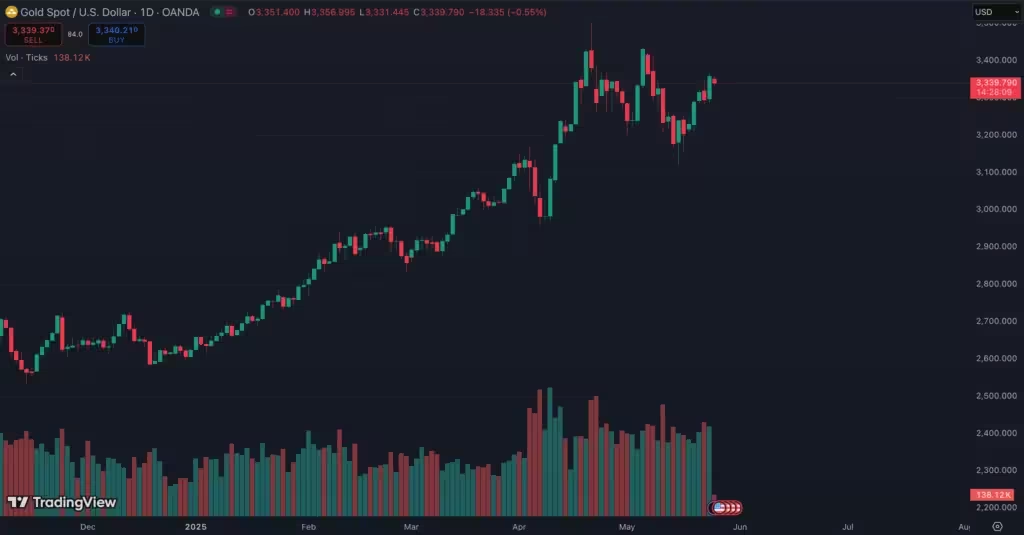5 Minutes
Economic Instability Fuels a Dramatic Rise in Gold Purchases
Amidst rapidly shifting economic landscapes and fiscal uncertainty around the globe, gold has resurfaced as a preferred safe-haven asset for both major investors and everyday savers. Market volatility, concerns about inflation, and skepticism about long-term currency stability have all contributed to an unprecedented gold buying spree—impacting not only Wall Street financiers but also ordinary people seeking portfolio resilience.
Seasoned Experts Shift Focus to Gold
Prominent financial experts like Marc Faber, famously known as "Dr. Doom" for his bearish market outlooks, have long touted gold as an essential part of a defensive investment strategy. According to recent reports, Faber allocates a significant 25% of his portfolio to gold and encourages his broad client base to increase their allocations as well. The trend is catching on: a steady stream of both institutional and retail investors are snapping up physical gold assets, citing an unpredictable economic outlook for 2025 and beyond.
Market Data Underscores Record-High Demand
The World Gold Council revealed that global demand for gold bars soared to 257 tons in Q1 2025—a 13% jump from the same period last year. Joe Cavatoni, market strategist for the Council, attributes this uptick to systemic worries about the U.S. dollar, rising national debt, and the mounting federal budget deficit. These fears have driven a noticeable surge in online searches for "gold bars," particularly during major announcements on tariffs and credit downgrades, underscoring how tightly economic news and investor sentiment are intertwined.

Innovative Product Features Meet New Consumer Needs
To meet the evolving demands of their client base, companies like Genesis Gold Group are innovating with products tailored for crisis scenarios. Genesis responded to the uptick in "prepper" and survivalist interest by releasing an Emergency Prepper Bar—a gold bar designed for easy division into smaller, tradable pieces, facilitating commerce even during periods of high uncertainty. CEO Jonathan Rose reports a 20% increase in sales of this product in the first quarter of 2025, with demand peaking alongside the announcement of new tariff measures by Donald Trump.
Comparison: Physical vs. Digital Gold in the Age of Technology
Notably, 70% of Genesis Gold Group’s customers now prefer to physically store gold at home—a huge jump from only 20% in previous years. This marks a sharp divergence from the trend toward digital assets like cryptocurrencies and digital gold products, highlighting the enduring appeal of tangible assets during turbulent times. Discussions within online communities, such as Reddit’s r/preppers (which has experienced 354% growth since 2020), are increasingly focused on whether to keep assets in cash, invest in physical gold, or split holdings between traditional and emerging technology-driven financial products.
Advantages of Gold as a Strategic Asset
Gold's unique attributes—its historical resilience, portability, intrinsic value, and universal acceptance—make it distinctly attractive in a high-tech age. With innovations now enabling smaller divisible bars and digital authentication tools, investors are assured of both liquidity and security, whether storing gold at home or leveraging blockchain-powered custody platforms. This hybrid approach is giving rise to new fintech solutions that combine the best of both worlds.
Performance: Outpacing Traditional Indices in 2025
Gold has appreciated by approximately 25% in 2025, dramatically outperforming mainstream equities like the S&P 500, which suffered a 1% decline year-to-date. While such rapid gains have prompted some analysts to question whether the gold-buying frenzy is overheating, most experts agree that the underlying drivers—geo-economic instability and doubts about monetary policy—are likely to sustain a strong appetite for gold.
Market Relevance: What Should Tech Investors Watch?
Gold remains a compelling complement to technology-driven portfolios. Whereas digital assets are vulnerable to regulatory uncertainty and cyber threats, gold offers a level of security that underpins long-term wealth protection. The latest wave of tech innovations—ranging from gold tracking apps to digital gold-backed tokens—are making it easier than ever for tech-savvy investors to integrate gold into intelligent asset strategies.
Looking Ahead: Challenges and Opportunities
Despite some relief in investor anxiety—spurred by political decisions like delaying European tariffs—sentiment remains fragile. Recent fluctuations saw gold prices dip slightly to $3,346 after a 1.9% jump, underscoring the asset’s sensitivity to global policy changes. Michael Brown of Pepperstone notes that lingering concerns over American sovereign debt and deficit policy, particularly after recent tax reforms, are likely to keep gold in high demand unless lawmakers offer clearer fiscal direction and stability assurances.
Even as leading financial institutions, such as Goldman Sachs and Barclays, reduce their recession forecasts, the broader market remains awash in uncertainty. Technical strategist Michael Boutros of StoneX emphasizes that volatility and economic tension are still the dominant themes. Until confidence in global growth returns, the consensus is that gold will maintain its position as a robust risk hedge.
Conclusion: Strategic Implications for Technology Professionals
Whether you’re a tech entrepreneur hedging business risk or an investor diversifying for the unknown, the current gold rush offers valuable lessons in strategic asset allocation and the integration of traditional and emerging technologies. As the financial world becomes ever more digitized, the enduring appeal of gold—supported by cutting-edge product innovations and digital infrastructure—demonstrates that sometimes, time-honored solutions still provide the most reliable foundation during uncertain times.


Comments